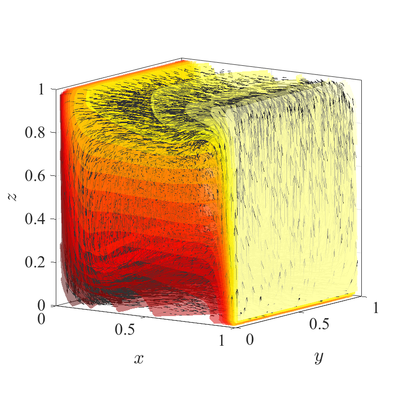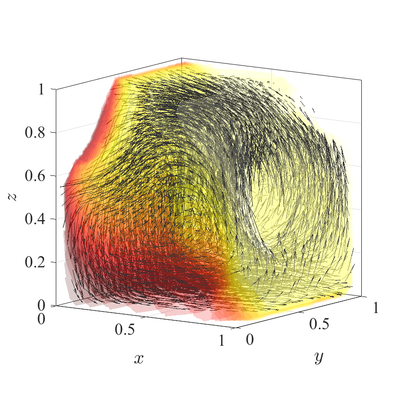Difference between revisions of "Natural convection in 3D irregular domain"
| (14 intermediate revisions by the same user not shown) | |||
| Line 1: | Line 1: | ||
The classical [[De Vahl Davis natural convection test]] can be extended to 3D. | The classical [[De Vahl Davis natural convection test]] can be extended to 3D. | ||
In below figures steady state temperature contour and velocity quiver plots | In below figures steady state temperature contour and velocity quiver plots | ||
| − | for Ra$=10^6$ case in 3D are presented. A more quantitative analysis is done by comparing characteristic values, i.e. | + | for Ra$=10^6$ case in 3D are presented. A more quantitative analysis is done by comparing characteristic values, i.e. |
| − | peak positions and values of cross section velocities, with data available in | + | peak positions and values of cross section velocities, with data available in literature. We analyze six different cases, |
| − | literature | + | namely Ra$=10^6,10^7,10^8$ in 2D, and Ra$=10^4,10^5,10^6$ in 3D. |
| − | namely $ | + | The comparison in presented in below table. |
| − | The comparison in presented in | ||
All spatial operators are discretized using RBF-FD with $r^3$ PHS radial basis | All spatial operators are discretized using RBF-FD with $r^3$ PHS radial basis | ||
functions, augmented with monomials up to order $2$, with the closest $25$ | functions, augmented with monomials up to order $2$, with the closest $25$ | ||
nodes used as a stencil. For the time discretization time step | nodes used as a stencil. For the time discretization time step | ||
| − | $\Delta t=10^{-3}$ was used for all cases. Nodal distance $h=0. | + | $\Delta t=10^{-3}$ was used for all cases. Domain is discretized with our [[Positioning of computational nodes|fill algoritm]] with |
| − | + | Nodal distance $h=0.025$. Boundaries with Neumann | |
| − | boundary conditions are additionally treated with | + | boundary conditions are additionally treated with [[Ghost nodes (theory)]]. |
[[File:DVD_3D.png|400px]] | [[File:DVD_3D.png|400px]] | ||
| Line 138: | Line 137: | ||
| 0.1443 | | 0.1443 | ||
|} | |} | ||
| + | |||
| + | [ref a for 2D] Couturier, H. & Sadat, S. Performance and accuracy of a meshless method for laminar natural convection Numerical Heat Transfer: Part B: Fundamentals, Taylor & Francis, 2000 , 37 , 455-467 | ||
| + | |||
| + | [ref b for 2D] Kosec, G. & Šarler, B. Solution of thermo-fluid problems by collocation with local pressure correction International Journal of Numerical Methods for Heat & Fluid Flow, Emerald Group Publishing Limited, 2008 , 18 , 868-882 | ||
| + | |||
| + | [ref a for 3D] Wang, P.; Zhang, Y. & Guo, Z. Numerical study of three-dimensional natural convection in a cubical cavity at high Rayleigh numbers Int. J. Heat Mass Transfer, Elsevier, 2017 , 113 , 217-228 | ||
| + | |||
| + | [ref b for 3D] Fusegi, T.; Hyun, J. M.; Kuwahara, K. & Farouk, B. A numerical study of three-dimensional natural convection in a differentially heated cubical enclosure Int. J. Heat Mass Transfer, Elsevier, 1991 , 34 , 1543-1557 | ||
Latest revision as of 16:03, 18 May 2019
The classical De Vahl Davis natural convection test can be extended to 3D. In below figures steady state temperature contour and velocity quiver plots for Ra$=10^6$ case in 3D are presented. A more quantitative analysis is done by comparing characteristic values, i.e. peak positions and values of cross section velocities, with data available in literature. We analyze six different cases, namely Ra$=10^6,10^7,10^8$ in 2D, and Ra$=10^4,10^5,10^6$ in 3D. The comparison in presented in below table.
All spatial operators are discretized using RBF-FD with $r^3$ PHS radial basis functions, augmented with monomials up to order $2$, with the closest $25$ nodes used as a stencil. For the time discretization time step $\Delta t=10^{-3}$ was used for all cases. Domain is discretized with our fill algoritm with Nodal distance $h=0.025$. Boundaries with Neumann boundary conditions are additionally treated with Ghost nodes (theory).
| Ra | $v_{max}$ | $x$ | $u_{max}$ | $y$ | |||||||||
|---|---|---|---|---|---|---|---|---|---|---|---|---|---|
| present | ref a | ref b | present | ref a | ref b | present | ref a | ref b | present | ref a | ref b | ||
| 2D | $10^6$ | 0.2628 | 0.2604 | 0.2627 | 0.0378 | 0.0380 | 0.0390 | 0.0781 | 0.0765 | 0.0782 | 0.8476 | 0.8510 | 0.0390 |
| $10^7$ | 0.2633 | 0.2580 | 0.2579 | 0.0226 | 0.0230 | 0.0210 | 0.0588 | 0.0547 | 0.0561 | 0.8705 | 0.8880 | 0.0210 | |
| $10^8$ | 0.2557 | 0.2587 | 0.2487 | 0.0149 | 0.0110 | 0.0090 | 0.0314 | 0.0379 | 0.0331 | 0.9189 | 0.9430 | 0.0090 | |
| 3D | $10^4$ | 0.2495 | 0.2218 | 0.2252 | 0.8500 | 0.8873 | 0.8833 | 0.2435 | 0.1968 | 0.2013 | 0.1611 | 0.1799 | 0.1833 |
| $10^5$ | 0.2545 | 0.2442 | 0.2471 | 0.9402 | 0.9317 | 0.9353 | 0.1564 | 0.1426 | 0.1468 | 0.1447 | 0.1493 | 0.1453 | |
| $10^6$ | 0.2564 | 0.2556 | 0.2588 | 0.9614 | 0.9653 | 0.9669 | 0.0841 | 0.0816 | 0.0841 | 0.1435 | 0.1403 | 0.1443 |
[ref a for 2D] Couturier, H. & Sadat, S. Performance and accuracy of a meshless method for laminar natural convection Numerical Heat Transfer: Part B: Fundamentals, Taylor & Francis, 2000 , 37 , 455-467
[ref b for 2D] Kosec, G. & Šarler, B. Solution of thermo-fluid problems by collocation with local pressure correction International Journal of Numerical Methods for Heat & Fluid Flow, Emerald Group Publishing Limited, 2008 , 18 , 868-882
[ref a for 3D] Wang, P.; Zhang, Y. & Guo, Z. Numerical study of three-dimensional natural convection in a cubical cavity at high Rayleigh numbers Int. J. Heat Mass Transfer, Elsevier, 2017 , 113 , 217-228
[ref b for 3D] Fusegi, T.; Hyun, J. M.; Kuwahara, K. & Farouk, B. A numerical study of three-dimensional natural convection in a differentially heated cubical enclosure Int. J. Heat Mass Transfer, Elsevier, 1991 , 34 , 1543-1557

